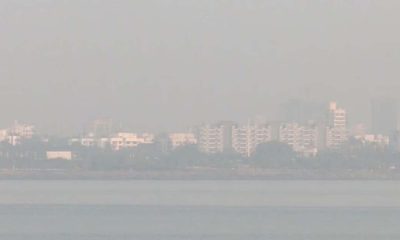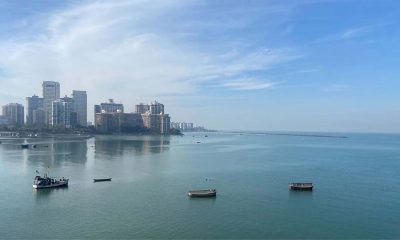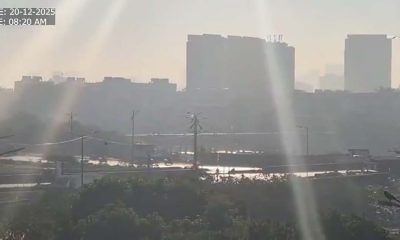National News
Jammu and Kashmir Votes From Sept 18 in 3 Phases, Single-Phased Haryana Election On Oct 1; Results On Oct 4 – Check Full Schedule Here
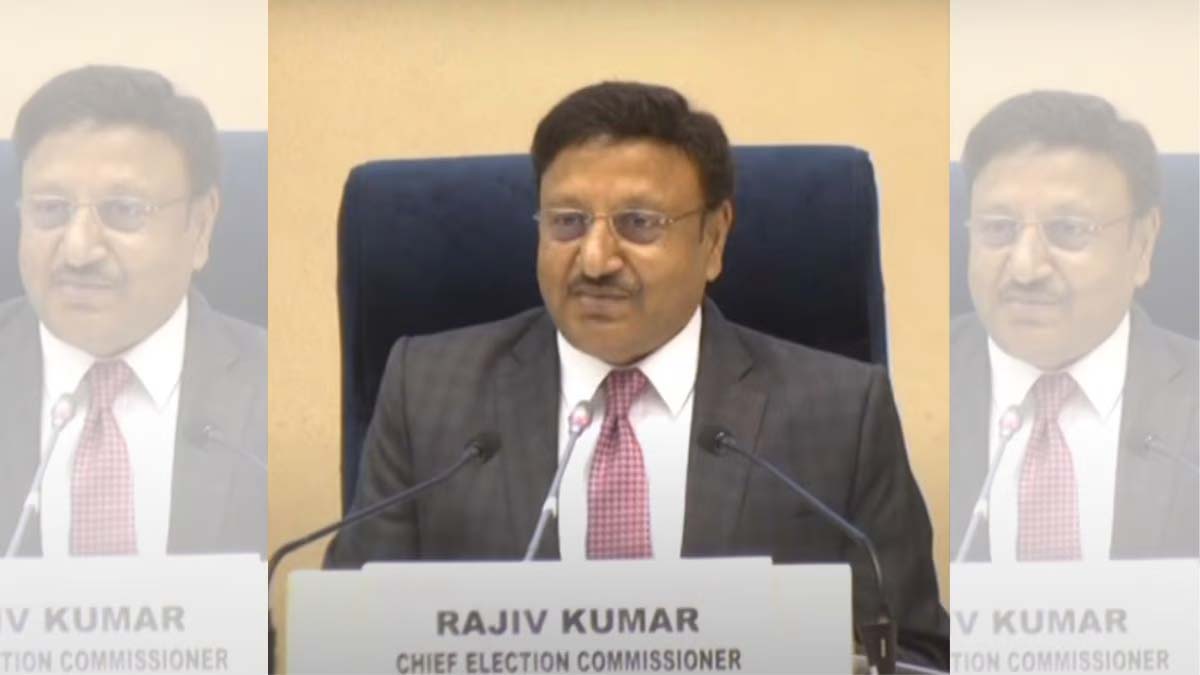
The Election Commission of India announced the schedule for assembly elections in Haryana and Jammu and Kashmir on Friday.
Addressing a press conference in the national capital, Chief Election Commissioner Rajiv Kumar said Jammu & Kashmir will go to polls in three phases.1 st phase on 18th Sept, 2nd phase on 25th September, 3rd phase on 1st October. Counting off votes will be held on 4th October.
Haryana votes in single phase for 90 seats on October 1, results to be declared on October 4. It will coincide with the last phase of Jammu and Kashmir. The announcement came after officials from the central poll body recently visited both states to oversee election preparations.
“There are a total of 90 assembly constituencies in Jammu and Kashmir, of which 74 are general, SC-7 and ST-9. There will be a total of 87.09 lakh voters in Jammu and Kashmir, of which 44.46 lakh are males, 42.62 lakh are females, 3.71 lakh are first-time voters and 20.7 lakh are young voters. The Amarnath Yatra will end on August 19 and the final voter list will also be published on August 20,” Rajvi Kumar said.
A look at region-wise elections in J&K
In Jammu and Kashmir, the main regions that will go to polls in the first phase are Pulwama, Anantnag, Shopian, Kulgam, Ramban, Kishtwar, Doda
The second phase will see elections in Srinagar, Ganderbal, Poonch, Rajouri, Reasi.
The final phase of polls comprises of north Kashmir, Udhampur, Jammu and Kathua going to polls in the Union Territory.
First Assembly Election in J&K Since 2014
Jammu and Kashmir may have assembly elections for the first time since the abrogation of Article 370. The union territory was under the president’s rule.
In December last year, the Supreme Court directed the central government to conclude the election process in Union territory by September 30, 2024. Jammu and Kashmir will witness elections after a gap of ten years, as the last assembly election was held in 2014.
The PDP-BJP coalition government fell in June 2018 when the latter withdrew support for the then-Chief Minister, Mehbooba Mufti. Recently, a poll body delegation led by Chief Election Commissioner Rajiv Kumar reviewed the poll preparations in J&K. During a press conference in Jammu during the visit, Kumar emphasised that the commission is committed to holding elections there “at the earliest”.
Business
Govt drive returns Rs 2,000 crore unclaimed savings to rightful owners

New Delhi, Dec 26: The government has succeeded in returning to the rightful owners a total amount of nearly Rs 2,000 crore that was stuck as “unclaimed savings” across banks, insurance, mutual funds, dividends, shares, and retirement benefits held within the regulated financial system, according to an official statement issued on Friday.
The funds have been restored through the Centre’s “Your Money, Your Right” nationwide awareness and facilitation initiative, launched in October 2025 to help citizens identify and reclaim unclaimed financial assets. The initiative is being coordinated by the Finance Ministry’s Department of Financial Services, with financial sector regulators reaching across digital portals with district-level facilitation.
Across generations, Indian families have saved carefully through opening bank accounts, purchasing insurance policies, investing in mutual funds, earning dividends from shares, and setting aside money for retirement. These financial decisions are taken with a hope and responsibility, often to secure children’s education, support healthcare needs, and ensure dignity in old age.
Yet, over time, a significant portion of these hard-earned savings has remained unclaimed. The money has not vanished, nor has it been misused. It lies safely with regulated financial institutions, separated from its rightful owners due to a lack of awareness, outdated records, changes in residence, or missing documentation. In many cases, families are simply unaware that such assets exist.
The volume of unclaimed financial assets in India is significant and spans multiple segments of the formal financial system. Indicative estimates suggest that Indian banks together hold around Rs 78,000 crore in unclaimed deposits. Unclaimed insurance policy proceeds are estimated at nearly Rs 14,000 crore, while unclaimed amounts in mutual funds are about Rs 3,000 crore. In addition, unclaimed dividends account for around Rs 9,000 crore, according to official figures.
Together, these amounts underline the scale of unclaimed savings belonging to citizens that continue to remain unused, despite being securely held within the financial system.
Your Money, Your Right is a nationwide effort to reconnect citizens with these forgotten financial assets and ensure that money that belongs to individuals and families ultimately finds its way back to them.
These unclaimed financial assets arise when money held with financial institutions is not claimed by the account holder or their legal heirs for a prolonged period. Such assets include:
*Bank deposits such as savings accounts, current accounts, fixed deposits, and recurring deposits that have not been operated for ten years or more.
*Insurance policy proceeds that remain unpaid beyond the due date
*Mutual fund redemption proceeds or dividends that could not be credited due to reasons such as a change in bank account, bank account closure, incomplete bank account in records, etc.
*Dividends and shares that remain unclaimed and are transferred to statutory authorities
*Pension and retirement benefits that are not claimed within the normal course
In most cases, assets may become unclaimed because of routine life events such as migration for work, changes in contact details, closure of old bank accounts, or lack of information among family members and legal heirs.
The Government is coordinating with the Reserve Bank of India (RBI), the Insurance Regulatory and Development Authority of India (IRDAI), the Securities and Exchange Board of India (SEBI), the Investor Education and Protection Fund Authority (IEPFA), and the Pension Fund Regulatory and Development Authority (PFRDA) to help citizens identify, access and reclaim financial assets that legally belong to them, using simple processes and transparent systems.
Crime
Family members of Unnao rape survivor, activists protest outside Delhi HC against Sengar’s bail
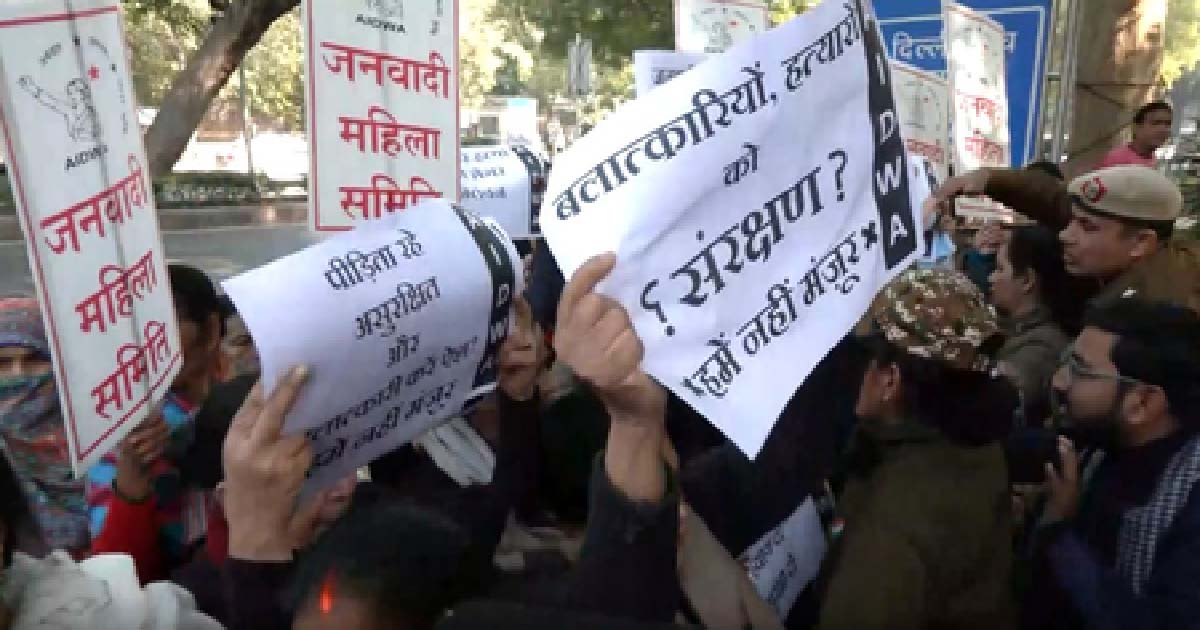
New Delhi, Dec 26: The family members of the Unnao rape survivor, along with women’s rights activists, on Friday staged a protest outside the Delhi High Court against the suspension of the sentence of Kuldeep Sengar, who was convicted in the Unnao rape case. The demonstrators raised slogans and expressed anger over the court’s decision to grant him conditional bail.
Protesters gathered near the court premises, holding placards and chanting slogans such as “Peedit rahe asurakshit aur balatkari kare aish? Humein nahi manzoor,” in support of the survivor and demanding strict action against the convicted former MLA. The protesters said the decision had “shaken public faith and sent a wrong message regarding crimes against women”.
Speaking to Media, the survivor’s mother said she still had faith in the justice system and the Supreme Court.
“If the Public Prosecutor stands with me and supports my lawyer, and if the CBI Public Prosecutor also takes a firm stand, there is hope. Honestly, I do not have much faith in the CBI, but I do have faith in the Public Prosecutor. I trust the Supreme Court and will keep knocking on its doors,” she said.
She further added that the bail should be cancelled and demanded the strictest punishment for the guilty.
“Any MLA, irrespective of religion or caste, who commits such a crime against a girl or a minor should be given capital punishment. That is all we want. I believe we will get justice,” she said.
Social activist Yogita Bhayana also criticised the system, stating that the survivor had been failed at multiple levels.
“First, she was raped and then gang-raped by a powerful person. It was not an ordinary criminal, but someone with influence. When a powerful person is involved, the system is often manipulated. It is very unfortunate that someone like Mr Sengar, who was extremely powerful, managed to get relief,” she said.
Bhayana added that activists would continue their fight for justice.
“We are seeking relief, and we should get it. If we do not get relief here, we will approach the Supreme Court,” she said.
The Delhi High Court on Tuesday suspended the jail sentence of Sengar.
A bench comprising Justices Subramonium Prasad and Harish Vaidyanathan Shankar granted him bail, directing him to furnish a personal bond of Rs 15 lakh along with three sureties of the same amount.
Business
2026 set to break new records with ‘Make in India’ and PLI schemes firmly in place

New Delhi, Dec 26: India’s electronics and semiconductor journey has moved from intent to execution – creating several new highs this year — and 2026 is set to break new records with ‘Make in India’ and production-linked incentive (PLI) schemes firmly in place — establishing India as a competitive and trusted electronics manufacturing destination globally.
According to government data, electronics production has increased sharply from about Rs 1.9 lakh crore in 2014-15 to around Rs 11.3 lakh crore in 2024–25. Electronics exports have also risen from Rs 38,000 crore to more than Rs 3.27 lakh crore during the same period.
India had only two mobile phone manufacturing units in 2014-15, which has now increased to around 300 units. Mobile phone production has grown from Rs 18,000 crore to Rs 5.45 lakh crore, while exports have surged from Rs 1,500 crore to nearly Rs 2 lakh crore.
Electronics exports have risen from Rs 38,000 crore to more than Rs 3.27 lakh crore during the same period.
Meanwhile, the Modified Electronics Manufacturing Clusters (EMC 2.0), located in 10 states with projected investments of Rs 1,46,846 crore, have estimated to generate about 1.80 lakh jobs.
Over the past decade, India’s manufacturing base, particularly in electronics and mobile phones, has expanded substantially, and the country has emerged as a net exporter in several key sectors.
According to Pankaj Mohindroo, Chairman, ICEA, this year marked a defining phase for ‘Make in India’, with the PLI framework firmly establishing India as a competitive and trusted electronics manufacturing destination.
“PLI has accelerated scale, deepened localisation, expanded exports and integrated India into global value chains. As we head into the next phase that is 2026. The sustained policy continuity, faster approvals and focus on component ecosystems will be critical to moving India from volume led manufacturing to high value, innovation-driven production,” he said in a statement.
Ashok Chandak, President of the India Electronics and Semiconductors Association (IESA) and SEMI India, said that India’s electronics growth story is no longer episodic — it is structural.
Policymakers, global and Indian industry leaders, and ecosystem stakeholders are now aligned on building resilient, sustainable, and globally competitive value chains, he mentioned.
“As discussions in 2025 highlighted — spanning policies and incentives, electronics value addition, skilling, academic partnerships, and industry collaboration — the next phase must focus on execution, joint R&D, and technology transfer. The increased use of locally made semiconductors and components will be central to deeper value addition and the long-term success of India’s electronics industry,” Chandak noted.
India’s semiconductor journey has also moved from intent to execution, marking a clear structural shift.
Policymakers, global and Indian industry leaders, and ecosystem stakeholders are aligned on building resilient and competitive semiconductor value chains.
Key priorities discussed in 2025, including semiconductor policies and incentives, human capital development, fabs, advanced packaging and OSAT, academic partnerships, and industry engagement, underscore the need for joint R&D, technology transfer, and well-defined pathways to scale.
Under the Semicon India Programme, 10 units have been approved with an investment of Rs 1.6 lakh crore, which include silicon fab, silicon carbide fab, advanced packaging, and memory packaging.
“Over the next three years, disciplined execution and localisation across design, manufacturing, and advanced packaging will be critical to enable chips for high-volume electronic products consumed locally,” said Chandak.
The government also launched a production-linked incentive scheme (PLI) for large-scale electronics manufacturing of mobile phones and certain specified components. The scheme has attracted investment of Rs 14,065 crore up to October 2025.
To target the manufacturing of IT Hardware, the government launched PLI for IT Hardware for promoting the manufacturing of laptops, tablets, servers and ultra small form factor (USFF) devices. PLI for IT hardware have attracted investment of Rs 846 crore till October 2025.
-

 Crime3 years ago
Crime3 years agoClass 10 student jumps to death in Jaipur
-

 Maharashtra1 year ago
Maharashtra1 year agoMumbai Local Train Update: Central Railway’s New Timetable Comes Into Effect; Check Full List Of Revised Timings & Stations
-

 Maharashtra1 year ago
Maharashtra1 year agoMumbai To Go Toll-Free Tonight! Maharashtra Govt Announces Complete Toll Waiver For Light Motor Vehicles At All 5 Entry Points Of City
-

 Maharashtra1 year ago
Maharashtra1 year agoFalse photo of Imtiaz Jaleel’s rally, exposing the fooling conspiracy
-

 National News1 year ago
National News1 year agoMinistry of Railways rolls out Special Drive 4.0 with focus on digitisation, cleanliness, inclusiveness and grievance redressal
-

 Maharashtra1 year ago
Maharashtra1 year agoMaharashtra Elections 2024: Mumbai Metro & BEST Services Extended Till Midnight On Voting Day
-

 National News1 year ago
National News1 year agoJ&K: 4 Jawans Killed, 28 Injured After Bus Carrying BSF Personnel For Poll Duty Falls Into Gorge In Budgam; Terrifying Visuals Surface
-

 Crime1 year ago
Crime1 year agoBaba Siddique Murder: Mumbai Police Unable To Get Lawrence Bishnoi Custody Due To Home Ministry Order, Says Report



